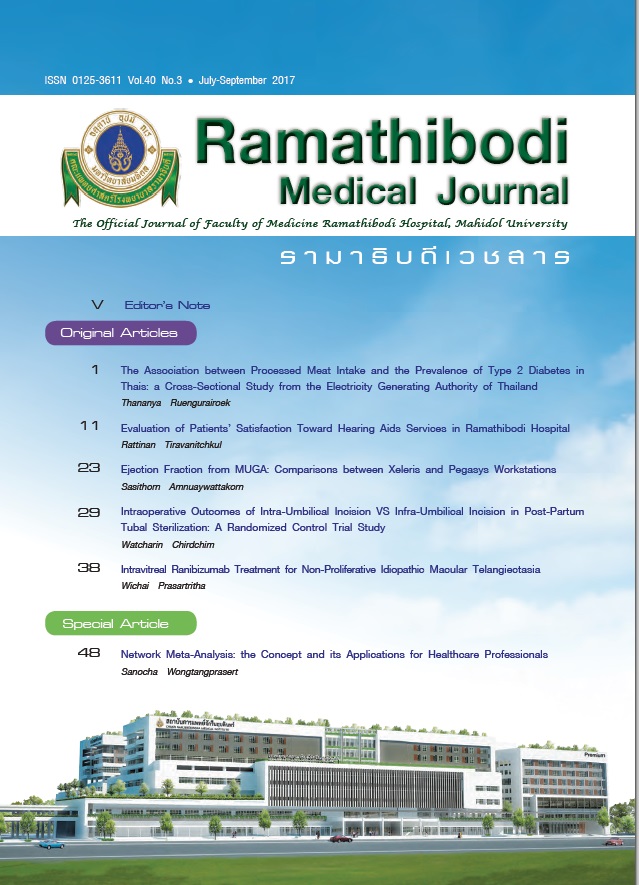The Association between Processed Meat Intake and the Prevalence of Type 2 Diabetes in Thais: a Cross-Sectional Study from the Electricity Generating Authority of Thailand
Keywords:
Processed meat, Diabetes, Socioeconomic status, Metabolic profileAbstract
Background: Type 2 diabetes (T2D) is a major health problem worldwide of which the complications are crushing burden. Previous studies reveal that consumption of processed meat is associated with higher incidence of T2D. However, the data outcomes are varied and the pathogenesis is still inconclusive.
Objective: This study aims to assess the association between processed meat consumption and T2D, and to investigate the influence of health-related factors and processed meat consumption and T2D.
Methods: A cross-sectional study was conducted in 2,017 subjects from population-based cohort study: the Electricity Generating Authority of Thailand study (EGAT) in 2013. Univariate and multivariate analysis were performed by logistic regression to reveal the association between processed meat intake and T2D and to adjust the potential confounders. The interaction terms were tested among these factors and T2D.
Results: The amount of processed meat consumption had a negative trend on T2D (P for trend = 0.03). The associations with T2D were also found in male (OR = 2.07; P < 0.001), high waist circumference (WC) (OR = 2.58; P < 0.001), undergraduated level (OR = 1.40; P = 0.01) and low serum non-HDL cholesterol (OR = 2.99; P < 0.001).
Conclusions: The higher processed meat intake has trend to increase a prevalence of T2D in all groups of BMI, WC, education level, serum cholesterol levels, smoking status and alcohol intake. Further long-term cohort study is warranted to confirm this finding.
References
Diabetic in Thailand 2015. http://www.idf.org/membership/wp/thailand. Accessed March 23, 2017.
Global disease compare: Thailand. http://vizhub.healthdata.org/gbd-compare/. Accessed March 23, 2017.
Peppa M, Goldberg T, Cai W, Rayfield E, Vlassara H. Glycotoxins: a missing link in the "relationship of dietary fat and meat intake in relation to risk of type 2 diabetes in men". Diabetes Care. 2002;25(10):1898-9.
Helgason T, Ewen SW, Ross IS, Stowers JM. Diabetes produced in mice by smoked/cured mutton. Lancet. 1982;2(8306):1017-22.
Pan A, Sun Q, Bernstein AM, et al. Red meat products consumption and risk of type 2 diabetes: cohorts of US adults and an updated meta-analysis. Am J Clin Nutr. 2011;94(4):1088-96. doi:10.3945/ajcn.111.018978.
Aune D, Ursin G, Veierød MB. Meat products consumption and the risk of type 2 diabetes: a systemic review and meta-analysis of cohort studies. Diabetologia 2009;52(11):2277-87. doi:10.1007/s00125-009-1481-x.
Micha R, Wallace SK, Mozaffarian D. Red and processed meat products consumption and risk of incident coronary heart disease, stroke, and diabetes mellitus: a systemic review and meta-analysis. Circulation. 2010;121(21):2271-83. doi:10.1161/CIRCULATIONAHA.109.924977.
Fretts AM, Howard BV, McKnight B, et al. Associations of processed meat products and unprocessed red meat products intake with incident diabetes: the Strong Heart Family Study. Am J Clin Nutr. 2012;95(3):752-8. doi:10.3945/ajcn.111.029942.
Fraser GE. Associations between diet and cancer, ischemic heart disease, and all-cause mortality in non-Hispanic white California Seventh-day Adventists. Am J Clin Nutr. 1999;70(3 Suppl):532S-8S.
Song Y, Manson JE, Buring JE, Liu S. A prospective study of red meat consumption and type 2 diabetes in middle-aged and elderly women: the women's health study. Diabetes Care. 2004;27(9):2108-15.
Kim Y, Keogh JB, Clifton PM. Consumption of red and processed meat and refined grains for 4weeks decreases insulin sensitivity in insulin-resistant adults: A randomized crossover study. Metabolism. 2017;68:173-83. doi:10.1016/j.metabol.2016.12.011.
Lijinsky W. N-Nitroso compounds in the diet. Mutat Res. 1999;443(1-2):129-38.
Piercy V, Toseland CD, Turner NC. Potential benefit of inhibitors of advanced glycation end products in the progression of type II diabetes: a study with aminoguanidine in C57/BLKsJ diabetic mice. Metabolism. 1998;47(12):1477-80.
Kurotani K, Nanri A, Goto A, et al. Red meat consumption is associated with the risk of type 2 diabetes in men but not in women: a Japan Public Health Center-based Prospective Study. Br J Nutr. 2013;110(10):1910-8. doi:10.1017/S0007114513001128.
Downloads
Published
How to Cite
Issue
Section
License
Copyright (c) 2017 By the authors. Licensee RMJ, Faculty of Medicine Ramathibodi Hospital, Mahidol University, Bangkok, Thailand

This work is licensed under a Creative Commons Attribution-NonCommercial-NoDerivatives 4.0 International License.













